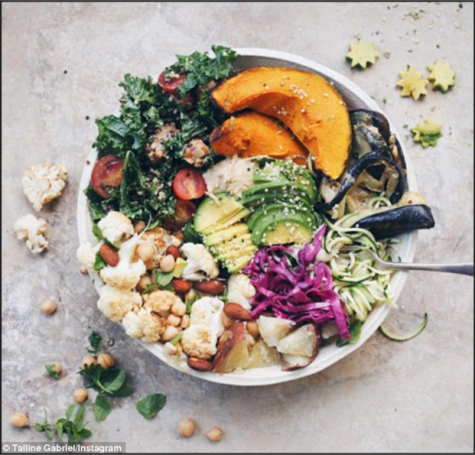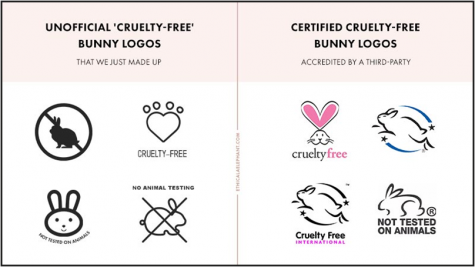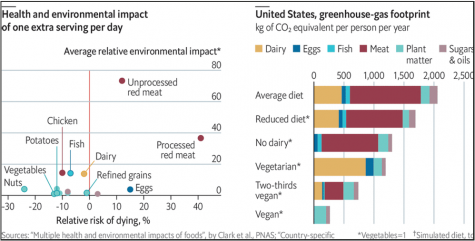Vegan and cruelty-free lifestyles rise in popularity
May 25, 2021
Vegan: a person who does not eat any food derived from animals and who typically does not use other animal products. This term has become much more popular recently, it seems, with menus offering vegan alternatives, grocery stores making space for plant-based foods, beauty brands updating their formulas to fit the animal-free criteria, influencers and celebrities raving about the diet, and health magazines and dieticians recommending the approach, praising its health benefits.
Why do people choose to go vegan? For many, the answer is simple. The mistreatment and killing of animals is a huge reason people choose to go vegetarian and vegan. While the meat industry is obviously cruel to animals, many people don’t realize that other industries can be super harmful as well. The cruel treatment of animals in the dairy industry has been a long-documented series of abuse towards cattle. In 2019, milk brand Fairlife (who branded itself as a more animal-friendly alternative to many traditional brands), came under fire after videos of calves being horribly abused at one of the company’s dairy farms were leaked.
This isn’t the first time this issue has been exposed. Online, countless photos, videos, and articles from The New York Times, The Humane Society, and local news outlets have exposed the never-ending stream of issues and animal cruelty within the dairy industry.
The egg industry, while not as widely talked about, is horribly cruel to chickens, and more than six billion male chicks are killed each year due to their inability to lay eggs.
Others choose to go vegan for environmental reasons. The carbon footprint of a vegan is 73% lower than the footprint of those who consume animal products, not to mention the negative impacts of cattle raising and mass fishing practices on the environment. Obviously, one individual going vegan isn’t going to prevent climate change, but every little bit can be helpful.
Another big reason people go vegan is weight loss/health benefits. Observational studies have shown that going vegan helps aid weight loss, lowers blood sugar levels, decreases risk of heart disease, and can alleviate pain from arthritis. Many people choose to go vegan in order to benefit their overall health.
Eating a vegan diet sounds pretty intimidating; no meat, milk, eggs, honey, or gelatin rules out many foods, not only in the grocery store, but from restaurant meals, snacks, and baked goods. It also rules out some things that could surprise you.
Non-vegan foods include marshmallows, some bread/bagels, processed white sugar, and McDonald’s french fries (in the US only, everywhere else they’re vegan).
That may seem discouraging, but on the other hand, surprisingly vegan foods include unfrosted Pop-Tarts, Oreos, canned frosting, and most baking mixes.
Going vegan has become increasingly more accessible as the popularity of the vegan diet increases. Grocery stores, drugstores, and even gas stations now often offer a variety of vegan options! From multitudes of vegan ice cream, meat substitutes, vegan instant meals, cheese alternatives, egg substitutes, dairy free milks, fully-vegan brands, and more clearly labeled packaging. This has made it way easier to avoid animal products without paying premium prices or having to drive far away to access an organic grocery store.
Restaurants now proudly display vegan options and alternatives on their menus, and while not as common, fully plant-based restaurants have begun popping up more than ever before. There are plenty of vegan recipes and cookbooks out there too, that often contain tips for ingredient substitutions, making favor-dupes of non-vegan items, and nutrient contents to make sure you’re getting the proper vitamins and nutrients from your meals.
A serious vegan may choose to apply a cruelty-free/vegan approach to all aspects of their life as well, not just when it comes to food. Being a lifestyle vegan would include boycotting all skincare, makeup, hygiene products, home decor, clothing, and accessories that aren’t cruelty-free or vegan. In home decor, clothing, and accessories, common non-vegan/cruelty-free ingredients include items such as down and leather. Common animal-derived ingredients in beauty/hygiene products include beeswax, lanolin, honey, keratin, collagen, carmine (a common red dye), and squalene.
These items are all on the list of ingredients that commonly pop up. For a product to be cruelty-free (not tested on animals), look for one of the three certified bunny logos that indicate that a product is cruelty-free, or look it up.
A recent victory for the vegan community was the removal of a Chinese law that mandated all beauty products sold in mainland China were required to be tested on animals. China lifting this requirement on many products is a huge step forward, but there are exceptions. Certain products (products for children/infants, sunscreen, hair dye, hair perming solutions, products made in China that are sold in mainland China stores, and products from companies without specific certifications) are still required to be tested on animals.
A safe bet until these testing requirements are completely lifted is to check if a brand sells their products in mainland China. If so, that brand is technically not cruelty-free.
Though living a vegan/cf lifestyle might seem overwhelming and difficult, many beauty brands are proudly certified vegan and cruelty-free, which they will label on their products. Some popular brands that fit these criteria include Elf, Hempz, Olaplex, Pacifica, and Real Techniques.
And although others may not be 100% vegan, cruelty-free brands like Garnier, Glossier, Shea Moisture, and many more may have vegan products in their arsenal. When in doubt about the ingredients list, or if you just want to find out fast, look it up online!
While going vegan might sound like a great option for some, there’s a few things that every individual should consider before jumping into a vegan lifestyle. Certain mindsets and medical

 conditions can make veganism difficult, and potentially dangerous. People who find it difficult to try (and like) new foods should consider if they would be able to maintain healthy levels of calories and nutrients on a vegan diet. Unfortunately, eating nothing but bread and fruit is not going to sustain anyone. However, it can get increasingly difficult and serious when the issue being considered is a medical condition.
conditions can make veganism difficult, and potentially dangerous. People who find it difficult to try (and like) new foods should consider if they would be able to maintain healthy levels of calories and nutrients on a vegan diet. Unfortunately, eating nothing but bread and fruit is not going to sustain anyone. However, it can get increasingly difficult and serious when the issue being considered is a medical condition.
People who have struggled with eating disorders or disordered eating should be careful about making this dietary change. Being vegan involves closely checking nutritional info to make sure no animal products are involved, enough nutrients are being consumed, etc. For people in ED recovery, nutritional information on food can be triggering, and the idea that certain foods are “off-limits” can be detrimental to recovery and building a healthy relationship with food.
Allergies can also make going vegan difficult, celiac disease or gluten intolerance paired with veganism restricts access to foods a lot. Plus, allergies to things like soy and nuts eliminate a lot of vegan substitutes and protein sources.
Other conditions that may make veganism more difficult include anemia, epilepsy, autism, severe burns/injuries, herpes, kidney failure, IBS, and IBD.
At the end of the day, anyone with a medical condition that affects daily life or diet should consult their doctor or a nutritionist before making drastic changes to their diet.
If you find that for whatever reason, you can’t or don’t feel comfortable going fully vegan, there are still ways you can work towards your ethical/environmental/health goals. Going vegetarian (no direct animal products: meat, gelatin), pescetarian (vegetarian, but fish/seafood is permitted), or just reducing your consumption of animal products/byproducts in any way helps contribute to the goal of environmental sustainability and better treatment of animals.
Recently, there’s been a large push to avoid red meat. Red meat (beef, especially) has many detrimental effects to not only an individual’s health, but the health of the environment. Consumption of red meat has been linked to an increased chance of heart disease, colorectal cancer and type 2 diabetes.
The environmental impact of red meat consumption, however, is much more worrying. The New York Times writes: “Almost 30 percent of the world’s ice-free land is used to raise livestock. Beef, far more than pork or chicken, contributes to environmental harm, in part because it requires much more land.”
Not only does raising livestock contribute to deforestation, but cows produce almost 10% of earth’s anthropogenic greenhouse gas emissions, which contributes to climate change.
Now, is climate change the direct fault of the everyday individual? No; until large corporations make changes to the devastating effects they have on the environment, climate change will continue to be an issue.
However, it can’t hurt for every individual to try and reduce their carbon footprint. Not only will it help the environment (even in a small way), but it helps lessen the demand for environmentally harmful products, in turn increasing the demand and market for more sustainable products and practices.
These are just a few examples, but it shows that any reduction in animal product consumption is a good one, whether it’s through diet or product usage. The trope of the “pretentious/aggressive/shaming vegan” certainly is a reality in some cases, but anyone who truly cares will understand that each situation is different, and that every contribution and change, large or small, is positive overall.
In the end, going vegan may seem daunting and impossible, but can really be an achievable and fun change! Countless websites, organizations, and books are out there to educate and answer any questions you might have about veganism. It benefits the animals, the environment, and your body’s health, and is becoming more affordable and accessible every day; so why not give it a try?